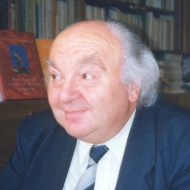The composer and musicologist Jaroslav Smolka took his first degree in music (science) at Charles University in 1956, and later on (1960 - 1964) undertook doctoral studies in the history of music under Mirko Očadlík. He had also studied composition at AMU (the Academy of Performing Arts) from 1953 to 1955 under Václav Dobiáš, with tuition from Ladislav Vycpálek, Otakar Jeremiáš, and later took lessons in composition also from Svatopluk Havelka and others. Karel Janeček, his teacher of musical theory at both institutions, had a major influence on his career as a composer and as an academic. Janeček was also Head of the Department of the Theory and History of Music at the AMU Music Faculty, where Smolka had taught from 1962 as a lecturer in the history of music. Many years later he himself was to become Professor (1991) and Head of Department there (2004). In the meantime, however, despite gaining his habilitation in music theory in 1968, Smolka was not appointed as docent until 1982, since his democratic political activities had earned him political disfavour. In 1993 he defended his doctoral thesis at the Philosophical Faculty of Masaryk University in Brno and received the title of Doctor of the Sciences of the Arts (DrSc.). So far he has published 10 musicological books and dozens of articles, was Chief Selection Advisor for Classical Music at the recording companies Supraphon (1960-62) and Panton (1970-1972), and has systematically cultivated music production: he has produced hundreds of recordings for LP and CD, and in 1994 established music production as a new subject at the Music Faculty of AMU. He writes as a music critic, and in 1996 became repertoire advisor to the Czech Philharmonic (until 2001).
In his early compositions from the period up to 1962, he developed the stylistic line of Czech music associated with the names of V. Novák and L. Vycpálek. In doing so, he introduced striking innovations in melodic and harmonic devices. Later, especially in certain vocal compositions (the songs, Majeránek v poli [Marjoram in the Field], the choral works Kohout sedí nad mrakem [The Cock Sits above the Cloud], and where appropriate in terms of subject or genre, he reinterpreted elements of neo-classical style (Novoklasická ouvertura [Neoclassical Overture] for orchestra, and the comic chamber opera Hra o zuby [Game over Teeth]). He also used both these traditional sources in works based on gradual stylistic progression in the course of compositions (the cycle of choral pieces Písně o vlnách (Songs about Waves), Pocta barokním mistrům [In Honour of the Baroque Masters] for cello, and the String Quartet no. 3 HOPAKAJU). The main stylistic trend of his work since 1963, however, has been musical expression based on solid construction and the use of the thoroughly atonal balance of twelve-tone or serial material, non-traditional principles of musical form (especially the consistent mirror forms, for example in the Spring Quartet no. 2, the organ cycle Metamorfozy [Metamorphoses], the Partita for 12 String Voices Per archi), aleatoric principles (Reflexy [Reflections] for violin, clarinet and piano, Sonata no. 2 Kontrasty [Contrasts] for piano, INREFUCO for brass and timpani, the Concerto for Cello and Orchestra Jenom ne strach [Just Don't be Afraid], Allegro balladico for cello and piano, etc.) While using such approaches, however, Smolka\'s work retains the solid tectonic unity of compositional wholes, vivid emotional impact, and the linking of music to extra-musical themes and messages (Choral Prelude for chamber orchestra, the Concerto Jenom ne strach already mentioned, the symphony Dialog tvarů [Dialogue of Forms], the piece for solo cello in memory of Bohumil Hrabal Chabres diservgias and others). He has also devoted himself to the reconstruction of historical compositions (Czech organ music of the 18th century, the major vocal-instrumental compositions of J. D. Zelenka, Fugue Suite based on Czech masters of the 18th Century for string quartet or string orchestra, the orchestral suites Motifs from Smetana's Notebook, from Janáček's The Travels of Mr. Brouček and others.)

